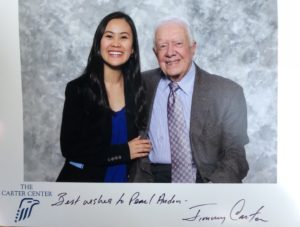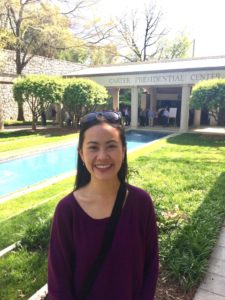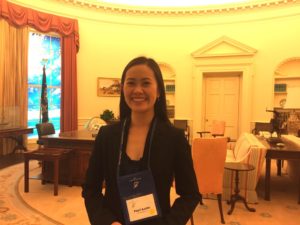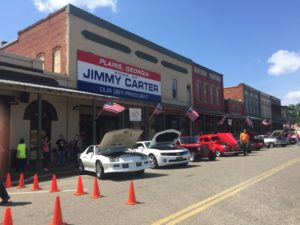 Before graduating, I had the amazing opportunity to meet former US President Jimmy Carter and attend the 2018 Carter Center Executive Briefing Conference, thanks to the generosity of another Scripps alumna Ms. Barbara Bruner. Founded by Jimmy and Rosalynn Carter in 1982, the Carter Center is a nongovernmental organization dedicated to alleviating human suffering through peace, public health, and human rights efforts to more than 80 countries. Each year, one Scripps student is selected to attend the conference to observe the inner-workings of the Carter Center, with a purpose of developing professional presence and meaningful connections. The Bruner Carter Center scholarship covers all fees including transportation, accommodations, meals, conference fees, excursions in Atlanta, and a two-day trip to Plains. Here, I reflect on a few snippets of my scholarship experience.
Before graduating, I had the amazing opportunity to meet former US President Jimmy Carter and attend the 2018 Carter Center Executive Briefing Conference, thanks to the generosity of another Scripps alumna Ms. Barbara Bruner. Founded by Jimmy and Rosalynn Carter in 1982, the Carter Center is a nongovernmental organization dedicated to alleviating human suffering through peace, public health, and human rights efforts to more than 80 countries. Each year, one Scripps student is selected to attend the conference to observe the inner-workings of the Carter Center, with a purpose of developing professional presence and meaningful connections. The Bruner Carter Center scholarship covers all fees including transportation, accommodations, meals, conference fees, excursions in Atlanta, and a two-day trip to Plains. Here, I reflect on a few snippets of my scholarship experience.
 The Carter Center Conference began with an evening conversation, “Liberia Looks to the Future”. Experts summarized the Carter Center’s involvement in Liberia’s recent election and its training of a new class of psychologists. I was amazed by the eloquence and political expertise of the speakers as well as the attendees who chimed in during the conversation. It became apparent that most of the conference goers have established careers in government and health. Frankly, it was intimidating. However, I could not miss my chance to ring in on the talk, so I queried about the recent mental health program implemented in Liberia. For my question, I prefaced about my hometown, a community filled with Vietnamese war refugees, and how there was a gap between mental health clinicians/resources and those who needed them. Although it was just one question, this led to follow-up discussions with the attendees throughout the rest of the conference. Most of the people around me were accomplished in their field, but it became less daunting once I put myself there, remained curious, and began to tell my story.
The Carter Center Conference began with an evening conversation, “Liberia Looks to the Future”. Experts summarized the Carter Center’s involvement in Liberia’s recent election and its training of a new class of psychologists. I was amazed by the eloquence and political expertise of the speakers as well as the attendees who chimed in during the conversation. It became apparent that most of the conference goers have established careers in government and health. Frankly, it was intimidating. However, I could not miss my chance to ring in on the talk, so I queried about the recent mental health program implemented in Liberia. For my question, I prefaced about my hometown, a community filled with Vietnamese war refugees, and how there was a gap between mental health clinicians/resources and those who needed them. Although it was just one question, this led to follow-up discussions with the attendees throughout the rest of the conference. Most of the people around me were accomplished in their field, but it became less daunting once I put myself there, remained curious, and began to tell my story.
 After two sessions discussing diplomacy in the Middle East and eradication of tropical diseases in Sudan, it came time to welcome Mr. President Carter for his talk. When he appeared at the door, I felt my heart palpitate that very instant; absolutely overwhelmed that I could be in the same vicinity with one of the most influential people in the United States. With President Carter now in the room, what did we talk about? In particular, many were wondering about his views on North Korea; hoping he can impart some wisdom. We think about the long-anticipated meeting between current North Korea and US leadership, but Jimmy Carter was actually the first former US President to visit North Korea back in 1994. The talk continued on with some back and forth questions from the audience about the food-shortages and nuclear testing in North Korea. Though the conversation revealed few plausible solutions, having President Carter’s talk be an open discussion on pertinent international relations was a rare opportunity for an undergraduate to participate in.
After two sessions discussing diplomacy in the Middle East and eradication of tropical diseases in Sudan, it came time to welcome Mr. President Carter for his talk. When he appeared at the door, I felt my heart palpitate that very instant; absolutely overwhelmed that I could be in the same vicinity with one of the most influential people in the United States. With President Carter now in the room, what did we talk about? In particular, many were wondering about his views on North Korea; hoping he can impart some wisdom. We think about the long-anticipated meeting between current North Korea and US leadership, but Jimmy Carter was actually the first former US President to visit North Korea back in 1994. The talk continued on with some back and forth questions from the audience about the food-shortages and nuclear testing in North Korea. Though the conversation revealed few plausible solutions, having President Carter’s talk be an open discussion on pertinent international relations was a rare opportunity for an undergraduate to participate in.
Trip to Plains, Georgia
 Three hours south of Atlanta you’ll find Jimmy Carter’s boyhood town of Plains, Georgia. Mr. Carter energetically welcomed us to his high school, childhood ranch, and church. We then enjoyed the city’s offerings of peach cobbler, car show, square dancing, historical monuments, and free peanut treats. Of all the activities in the town, I would highly recommend attending President Carter’s Sunday school at the Maranatha Church. It was a widely anticipated service with us waking up at 5:00 a.m. and standing in pouring rain to get checked by the Secret Service, but it was worth the wait to hear about the city’s faith.
Three hours south of Atlanta you’ll find Jimmy Carter’s boyhood town of Plains, Georgia. Mr. Carter energetically welcomed us to his high school, childhood ranch, and church. We then enjoyed the city’s offerings of peach cobbler, car show, square dancing, historical monuments, and free peanut treats. Of all the activities in the town, I would highly recommend attending President Carter’s Sunday school at the Maranatha Church. It was a widely anticipated service with us waking up at 5:00 a.m. and standing in pouring rain to get checked by the Secret Service, but it was worth the wait to hear about the city’s faith.
Four days with the Carter Center proved to be an indelible and transformative experience. Not only did I meet incredible people along the way, I also had the chance to speak up about topics that were foreign to me. Above all, I am grateful for an experience I was not expecting: following President Carter’s trajectory from his upbringing in a humble town to his Presidency and, now, to his lifetime commitment to peace with the Carter Center. It gives me hope that even in positions of power, and as I proceed in my own life ventures, one can still continue to promote peace and the improvement of lives in one’s community and around the world. For this, I cannot thank Barbara Bruner enough for having me as her guest this year.
How can strengthen your application?
- Before applying for the Carter Center Executive Briefing, familiarize yourself with CP&R and their many resources and events.
CP&R is an incredible resource available to help you with any aspect of your career development. One of their events, Coffee Chat with Barbara Bruner, is held at the beginning of spring semester and was very useful in learning about the Carter Center’s mission and how to fortify your application. Seeing that I needed to highlight various experiences in my repertoire to be a strong candidate, I studied abroad in Spain and participated in a public health observership in México. My summers were dedicated to enhancing diabetes programs, conducting my senior thesis, and partaking in many presentations. For these summer/full-year opportunities, CP&R assisted me through internship grant sessions, job search fairs, and resume editing events and ultimately, this helped me submit a strong application for the Carter Center Executive Briefing.
- Apply for one of CP&R’s Career ExplorationTreks.
Getting to travel and visit companies (sponsored by CP&R!) with the staff pushes you to grow and represent yourself well in a professional setting. At every career event thereon, I look back at the invaluable skills of succinct questioning and self-advocacy I garnered from the San Diego Health, Research, and Networking Trek in Fall 2017.
- Be informed and well prepared for the interview.
Whether you are attending the conference to focus on human rights, peace issues, or public health, it is important to show the selection committee that you are inquisitive, informed, and taking the interview seriously. To accomplish this, you must be prepared and dress professionally. I would recommend perusing the programs of the Carter Center. The Carter Center also offers internship programs year round which you can refer to in your interview, if applicable. Do your homework and demonstrate your interest!
All of the prior research and preparation help tremendously, but remember to never give up, have faith, and be your best advocate. Feel free to contact me about the scholarship, application, and/or interview process at [email protected].
Good luck!
